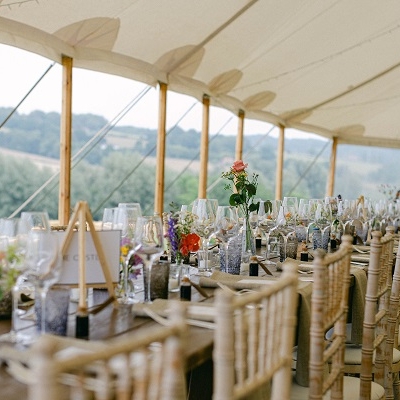Here is a selection of Q&As from Your London Wedding magazine whether it be about flowers, hair and makeup, fashion, wedding themes, health & beauty, cakes, stationery, legal advice. If you would like your question answered by our experts, please email it to editor@yourlondon.wedding
To view more expert advice on a different topic, please select one from the list below.

Planning SOS
| Q | What upcoming wedding trends should we look out for? |
| A | Emma Gold says: A trend we're seeing more and more of is the hotel buyout; couples are keen for total exclusivity and privacy for their guests. It's no longer enough to take a few rooms or event spaces for the day or the weekend. Guests are taking over entire hotels going forward, allowing guests to spend quality downtime together too. From a logistical perspective, it's hugely helpful in ensuring guests are at the right place and time. AI-generated wedding speeches have been around for some time, and we're now seeing couples use them to help with guest lists and table planning. By entering some key references, AI can generate a plan within moments. Refining the seating plan and the couples' input is still essential. Guests are truly interested in what we do to protect the planet while we party. This may be from something as small as having biodegradable confetti. Our couples are looking at how they can make changes to improve the sustainability of their celebrations. We are often tasked to use local, seasonal plants and flowers indigenous to our area. It extends from environment to social, with many couples not requesting gifts but donations to favourite charities. As we know, food is a huge part of celebrations for many. For our clients, it can be one of the most integral parts or a minor focus, but one requirement never changes – the quality of the ingredients. Guests are asking for hyper-local, provenance-traceable ingredients that speak for themselves. |
Emma Gold, GSP Events

Wedding Nervous
| Q | I'm getting nervous about my wedding speech as I hate public speaking! What advice can you share with me? |
| A | Matthew Shaw says: Speeches can sprawl quickly when you're trying to cover so much, making them difficult to follow. When planning your speech, it's helpful to throw many ideas around but then focus on an overall theme or approach. This could be a personality trait, a great joke or a more heartfelt approach. When it comes to content, remember to keep it clean and universal. By all means, poke fun at your subject with a glint in your eye, but consider who may be present and keep the shaming stories for another time. Similarly, consider what your audience can relate to. No one wants to sit through five-minutes of private jokes they don't understand! It's challenging to distil a friendship or relationship into a couple of minutes, but you will be thanked for this – I recommend three to five minutes and no more than eight. The groom or bride can allow themselves longer. A clear, tight structure will help you deliver a brilliant speech and leave everyone wanting more. This is equally important on the day itself; do not go off script and meander through your thoughts. If you lose your place, you can pause and refer to your notes, but do not freestyle and make it up as you go along. I have never seen a long wedding speech that has been well received. Listen and respond to other speeches; this is a slightly harder tip to follow, but it will make your speech seem authentic and give it a place among the celebrations. Rehearse enough so you know the overall structure and points off by heart, and then use notes as a guide on the day. Your speech will feel much more natural for this and help you look up and out across the room. Make eye contact around the room instead of with the floor before you, and don't read off your phone! My acronym for putting the finishing touches on an excellent speech is body language, speed and energy. Once you've written your speech, the crucial next step is to rehearse it so you're comfortable with your material and delivery. Ensure you rehearse in front of the mirror so you can see how you deliver the speech. Watch for any nervous ticks and what your hands are doing. Remember to keep it slow. We have a habit of speaking fast when nervous, making it hard for our audience to follow. I suggest recording yourself so you can play it back and work out how much to slow down. It's also essential to allow moments to pause for reaction and to take your breath or a sip of water. To avoid monotone delivery, work out the energy of each section in your speech and practise moving between different registers. This will help keep it exciting and ensure your audience follows along. |
Matthew Shaw, Sauveur